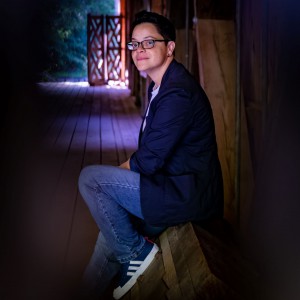In some ways, becoming a poet was Sarahí Almonte Caraballo’s destiny.
Sarahí is the 33rd of Juana Rivera’s 46 grandchildren. Rivera wrote a little poem on the last page of Caraballo’s baby album.
“I read that poem as a kid and I fell in love with it because, first of all, it’s a poem about you. Right? I remember as a kid knowing that this was something she wrote and I felt special. I loved the way it sounded,” Sarahí said.
At the age of six, her aunt gave her a Hello Kitty journal. Using the letters of Sarahí’s name to start each line, her aunt wrote a poem in the notebook.
With those two anointings, Caraballo’s poetic path was set.
“That’s how I fell in love with poetry,” said Caraballo, who works as a nurse and lives in Wallingford. “I tried to dabble in a little bit of everything but I consider myself primarily a poet and then essayist. Someone said to me a long time ago that I was really good at keeping things short. I like to tell the story and get to the point quicker. I’m not really long-winded so you won’t get a trilogy out of me.”
Sarahí will be interviewing bestselling writer Julia Alvarez on March 25 to conclude the month-long NEA Big Read celebration. “Every Latinx writer knows Julia Alvarez. Julia’s books were the first books that you found that were written by somebody who looked like you, sounded like you, and who had stories that you literally could relate to,” Almonte said.
Caraballo is excited at the prospect of interviewing Alvarez. She’s doing research on Alvarez’s work, looking at previous interviews, and polling her writer friends seeking for questions that will prompt a real conversation.
“I want to ask her everything from, what brought you to writing to what’s the thing that keeps you writing?” she said.
It’s a question that Sarahí herself has a good answer for.
As a teenager, Sarahí started reading poetry. She began writing it shortly thereafter.
Caraballo believes that writing is an act of self-definition. Being published isn’t what’s important. It’s a matter of being willing to pick up a pen every day. “We just need to keep telling our story. If you’re writing in a journal, you’re still writing. If you’re writing on napkins, you’re still writing. Nobody can tell you if you’re a writer but yourself. You don’t need that validation from anyone,” she said.
Writing was Caraballo’s way of learning more about herself.
“I realized that what I thought I was had a name and back in the day you were either gay or lesbian so I picked lesbian,” she said.
Without yet being able to talk about her sexuality, writing became Caraballo’s way to express this important part of herself. “My journal was the place that I turned to write about everything. I knew it was a safe space,” she said.
Caraballo kept writing because she felt that the stories she was reading didn’t reflect her life experience. “Our stories have been either told by others or they’ve been somehow morphed into something that they are not. I realized that our voices need to be heard. We needed more people with our stories on the bookshelves because when we go to library, we like to find things that connect us,” she said.
Caraballo might be looking for advice from Alvarez, but her experience writing heartfelt poetry and essays has given her license to offer wisdom to aspiring writers:
“Just keep writing. Be honest in your writing. You don’t need to make things up. You need to just be honest about your writing and what you’re writing about. It’ll show. There will certainly be a connection,” Caraballo said.
– By Steven Scarpa, manager of communications and media relations
– 30 -

Is there any way to find out the title of the poem that Sarahí Almonte Caraballo read at the end of the talk last night? I am a high school English teacher currently teaching _In the Time of the Butterflies_ and I would love to be able to share that piece with my students.